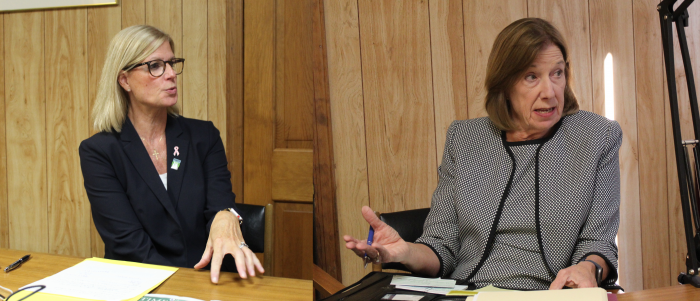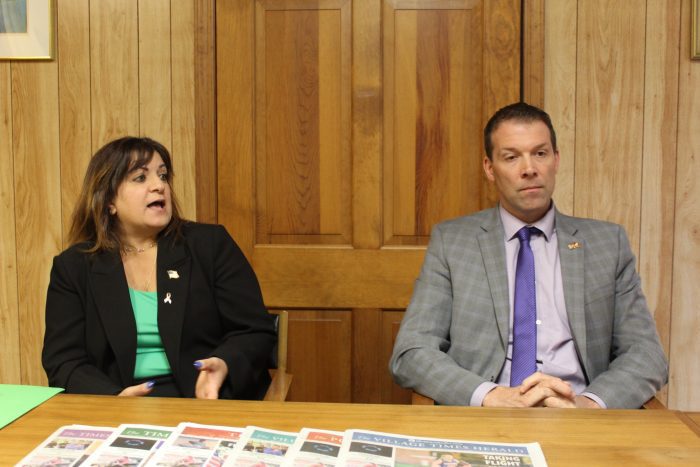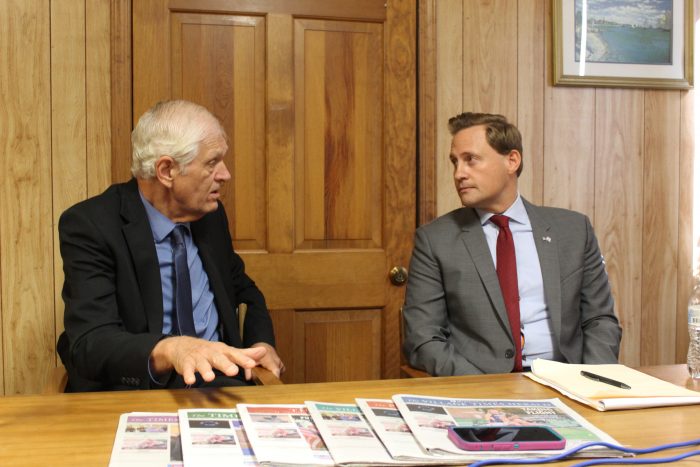This year, incumbent Town of Brookhaven Councilwoman Jane Bonner (R-Rocky Point) is defending her seat against attorney Carol Russell (D-Coram).
The district lines for Council District 2 shifted substantially due to last year’s redistricting process. Covering the northeastern hamlets from Mount Sinai to Wading River, the district expanded southward and received a sizable chunk of Coram.
In a debate at the TBR office with the two candidates, Bonner, who was first elected to the office in 2007 and has held the seat ever since, explained the motivations behind her reelection bid. “I think my record has proven itself — hands-on, full time, civic-minded,” Bonner said. “I’ve been instrumental in putting the town on the right track, and I’m looking forward to serving four more years.”
Her opponent is a former critical care nurse who transitioned into the law and spent three decades representing nurses. After ending her legal practice in 2017, Russell became a more active member in her family farm business in Coram.
She cited her community involvement efforts, such as mentoring with the Dress for Success Brookhaven program and volunteering for the mock trial team at Longwood High School.
“I’ve been a patient advocate, a legal advocate, a women’s advocate … and I’m a voter-protection advocate,” she said.
Quality of life
In speaking with CD2 residents, Russell highlighted affordability and taxes as a paramount policy concern. She said public safety, particularly the opioid crisis, has been a significant local concern.
“Overdevelopment and the environment are big concerns of a lot of people,” she said. “We want to keep our open space. We don’t need any more 5,000-square-foot, multifamily, million-dollar homes. We need workforce housing. We need redevelopment of our blighted areas … and our abandoned properties.”
She also suggested that the town’s permitting process could be streamlined.
For Bonner, crime and public safety are her highest priorities. She said the district is seeing a high volume of “squatting issues” and vacant homes that have stalled in the foreclosure process.
She said preserving open space remains a critical policy focus for the 2nd District. “I was instrumental in helping to preserve the over 700 acres in Wading River that was slated to be clear cut for a solar farm,” the incumbent said. “I was instrumental in helping craft that legislation that you can’t clear cut woods to create solar farms.”
She added that being mindful of the tax burden on residents remains another quality-of-life concern for her.
Vacant storefronts
Lining some of the primary commercial corridors within CD2, such as state routes 25 and 25A, are vacant storefronts, signaling a difficulty in attracting and sustaining businesses within the area.
Bonner supported adjusting land-use policies to adapt to the new commercial real estate climate created by the COVID-19 pandemic.
“As we evolve out of this pandemic, we need to go back and adjust these land-use plans to allow for different uses than [those that] were originally adopted,” she indicated. “And we’ve started to do that.”
Russell referred to these blighted commercial areas as “very complicated.” She called for creating a master plan to guide the development of these commercial zones. “I think we really need to find a good, comprehensive plan to bring back the stores and the commercial industry,” she said. “It’s changed over the years, but it hasn’t changed that dramatically since COVID.”
The challenger added, “People want to shop local. They want to be engaged with the business owners. … I just think we need to do better with a comprehensive development plan to redevelop those blighted areas.”
Traffic/pedestrian safety
Russell stated that “the roads around here are horrible.” She raised concern over trail crossings, advocating for roadway reconfigurations at these intersections. She also supported other pedestrian safety enhancements to promote walkability in places with greater foot traffic.
“We need more sidewalks,” she said. “Wherever there are shopping centers and strip malls, and particularly where they are crossing the street, we need to have sidewalks so people can park on one side and get to the other side if they need to.”
Bonner cited a recent article referring to 25 and 25A as among the most dangerous state routes on Long Island. To ameliorate traffic safety concerns, she said she has coordinated with the town’s Highway Department in obtaining grants for sidewalks, driver-feedback devices and striping.
She said continued collaboration with the New York State Department of Transportation, which oversees the state roadways, remains challenging. “I will tell you that the DOT is one of the most difficult agencies to deal with,” she said. “We work with other partners in government on the roads that [the town is] not responsible for, but they are responsible to help bring about some traffic-calming measures.”
Affordability
Throughout the region, seniors and young people are becoming priced out, fleeing the region for places with a lower cost of living. Given the land-use powers within town government, Bonner said the town is already pursuing some “large-scale affordability projects” within the district.
“The Mount Sinai Meadows project and the amenities that they offer will be geared toward millennials to keep them on the North Shore and in the community in which they grew up,” the councilwoman indicated.
She added that wastewater remains a factor in supporting new residential units. “We lack sewers on Long Island, especially on the North Shore,” she said. “I have every confidence that whoever our next county executive is he is going to figure out this sewer bill” — referring to the county’s Water Quality Restoration Act — “so we can hit the ground running regarding affordability projects for our seniors” and youth.
For Russell, promoting affordability starts with reforms within the Brookhaven Industrial Development Agency. “I think the Town Council has the responsibility when it appoints members of the IDA to not reappoint them if they’re not bringing in affordable housing — workforce housing,” she said. “That’s what’s going to keep our students when they graduate here. That’s what’s going to keep our seniors here.”
She agreed with the incumbent’s assessment of the need for modernized wastewater infrastructure but said the 2nd District would likely require Innovative/Alternative septic systems instead of sewers. She advocated for the town to take greater initiative in modernizing the area’s wastewater systems.
“I think what has to happen is a little less of, ‘That’s the county’s job,’ or, ‘That’s the state’s job,’ and a little more of, ‘We all need to be working together,’” Russell said, adding, “All of the departments have to be working together.”
Voters will get the final say on these two candidates Tuesday, Nov. 7.







